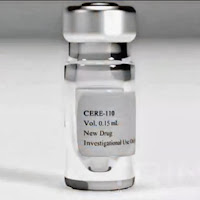VIDEO + ARTICLE
CERE-110 is a big step forward for Alzheimer’s clinical trials. It induces brain cells to make their own nerve-growth-factor, so they can restore and protect themselves. In Phase 1 clinical trials, it succeeded in stabilizing brain cell metabolic activity. Find out more as CERE-110 trials move to the next phase.
RICHMOND, Calif., — Sangamo BioSciences, Inc. announced positive data from the Phase 1 clinical trial of CERE-110 (AAV-NGF), a gene therapy approach designed to deliver nerve growth factor (NGF) for the treatment of Alzheimer’s disease (AD). This novel product was developed by Ceregene, Inc., which was recently acquired by Sangamo. The data were presented at the Sixth Clinical Trials on Alzheimer’s Disease (CTAD) Meeting.
Continued below video…
The data from this dose escalation study demonstrate that surgical delivery of CERE-110 to the brain results in the long-term expression of bioactive NGF, the therapeutic protein. Clinicians also observed apparent stabilization of brain cell metabolic activity in treated subjects, as determined by PET-scans measuring glucose use, which may reflect a slowing of cell deterioration. The treatment was well-tolerated at all dose levels.
“These early clinical data demonstrate that this therapeutic approach is feasible, well-tolerated and results in appropriate delivery of the therapeutic, NGF protein, to the intended target cells in the brain,” said Paul Aisen, M.D., Project Director of the ongoing Phase 2 clinical trial of CERE-110 and director of the Alzheimer’s Disease Cooperative Study (ADCS) at the University of California San Diego, a preeminent research consortium for testing new treatments for Alzheimer’s disease. “We are very pleased to be involved in the Phase 2 clinical trial, which is a placebo-controlled study, and will enable further evaluation of the efficacy of CERE-110. Alzheimer’s disease has few effective treatment options, and this therapy could help the over five million people in the U.S. currently living with the disease.”
The Phase 2 clinical study of CERE-110 is being carried out in collaboration with the ADCS and is funded by a grant from the National Institute on Aging (NIA), part of the National Institutes of Health (NIH).
“We are very encouraged by the Phase 1 data from the CERE-110 study,” stated Edward Lanphier, Sangamo’s president and CEO. “These positive data supported the further testing of this novel approach in a Phase 2 clinical trial to evaluate efficacy. The Phase 2 study is fully-funded and fully-enrolled and currently in the two year follow-up phase. We look forward to presenting data from the clinical trial in 2015.”
The data, which have been accepted for publication in Alzheimer’s and Dementia (Rafii, et. al., 2014), the official publication of The Alzheimer’s Association, were presented by Raymond Bartus, Ph.D., who led the preclinical and early clinical development of CERE-110.
It is well-documented that cholinergic nerve cells in the brain degenerate early in AD and are linked to initial memory loss and cognitive decline. Current therapies for AD include a class of small molecule drugs called cholinesterase inhibitors, which aim to preserve or enhance the chemical signaling in cholinergic nerves. However, these drugs have dose-limiting side-effects, do not change the underlying disease process or its progression, are effective for some but not all people, and may help only for a limited time.
Research in animal models suggests that growth factors, such as NGF, which promote nerve growth, nerve repair and protect nerves against damage, may improve AD symptoms and slow disease progression. However, delivery of proteins to the appropriate part of the brain, in a manner that enables them to have a therapeutic effect, has proved challenging due to the blood brain barrier. Gene therapy with AAV, combined with stereotactic surgery, enables delivery of the gene encoding a biologically active protein such as NGF to a precise location in the brain. The nucleus basalis of Meynert (NBM), a structure near the base of the brain, is considered to be the best target for delivery of a gene-based therapeutic for AD as its cells represent the primary source of cholinergic nerves projecting to the brain cortex. Thus, a single treatment of CERE-110 into this structure is expected to provide a safe long-term source of NGF protein that may protect and preserve cholinergic cells in the brains of AD patients and potentially slow disease progression.
About the CERE-110 Phase 1 Study and Summary of Data Presented at the CTAD Meeting
Ten subjects (10) with mild to moderate AD were treated with a single administration of CERE-110 in an open-label dose-escalation study to evaluate three different doses of the therapeutic (two dose cohorts of three subjects each and the third, highest dose, of four subjects). The drug was delivered by standard stereotactic surgery into the NBM and subjects were followed for 24 months. The trial was designed to evaluate safety and tolerability, and signs of efficacy.
The data demonstrated that:
- The treatment is feasible and well tolerated. Serious adverse events (SAEs) were transient, acceptable and related to the surgical procedure. AEs were not dose-related and not related to either the AAV or NGF
- Long term expression of NGF was observed in brain tissue, with desired changes in neuronal cell volume of targeted neurons providing evidence of bioactivity
- Preservation of glucose utilization, as measured by 18FDG (Fludeoxglucose) Positron Emission Tomography (PET) brain imaging, was observed through the 24 months of the study suggesting that the nerve cells of the brain were not deteriorating significantly over this time period
- Efficacy assessments such as mental state (MMSE), cognition (ADAS-Cog) and activities of daily living (ADAS-ADL), demonstrated no evidence of accelerated decline over 24 months, although the sample size was too small to allow any conclusions to be drawn regarding improvement in symptoms.
About the Ongoing CERE-110 Phase 2 Study
Forty-nine (49) patients with mild to moderate AD were treated with a single administration of CERE-110 at 10 clinical sites throughout the U.S. Approximately half of the patients received CERE-110 while the other half received an appropriate sham (placebo) surgery control treatment. Patients will be followed for a minimum of two years with respect to safety, brain imaging, as well as measures of cognitive function and quality of life – standard tests used in Alzheimer’s clinical trials. The clinical study was carried out in collaboration with the Alzheimer’s Disease Cooperative Study (ADCS) based at the University of California San Diego (UCSD) and funded by a grant from the National Institute on Aging (NIA). Data are expected in 2015.
About CERE-110
CERE-110 is an adeno-associated viral (AAV) vector that encodes the gene for nerve growth factor (NGF), a naturally occurring protein that maintains survival of nerve cells in the brain. CERE-110 is surgically injected into the nucleus basalis of Meynert (NBM), a brain region where cholinergic nerve cell degeneration occurs in AD. Delivery of NGF using an AAV vector has the potential to induce sustained expression of NGF, resulting in long-lasting protection and preservation of cholinergic nerves. The cholinergic system is important in memory and cognitive function, and a restoration of the function of this system may slow the progression of the disease and possibly improve memory in individuals with AD.
About Alzheimer’s Disease (AD)
Alzheimer’s disease is a progressive disorder of the brain that gradually affects one’s memory and ability to learn, reason, communicate and carry out daily activities. There are now more than five million people in the United States living with AD, and there is currently no cure.
About CTAD
Since 2008, CTAD has been a conference organized and planned by AD clinical researchers for AD clinical researchers. CTAD embraces the organizing committee mandate to maintain CTAD’s unique role in AD research: To provide a substantive, clinical research-oriented conference and an annual opportunity for the world’s preeminent clinical researchers to engage in both formal and informal exchanges of views. CTAD’s ongoing commitment to providing a relatively intimate forum has resulted in the conference’s reputation of facilitating and fostering international collaboration in AD clinical research matters. More information is available at www.ctad-alzheimer.com.
About Sangamo
Sangamo BioSciences, Inc. is focused on research and development of novel DNA-binding proteins for therapeutic gene regulation and genome editing. The Company has ongoing Phase 2 and Phase1/2 clinical trials to evaluate the safety and efficacy of a novel ZFP Therapeutic® for the treatment of HIV/AIDS. As part of its acquisition of Ceregene Inc., Sangamo acquired a fully-enrolled and funded, double-blind, placebo-controlled Phase 2 trial to evaluate NGF-AAV (CERE-110) in Alzheimer’s disease. Sangamo’s other therapeutic programs are focused on monogenic diseases, including hemophilia, Huntington’s disease and hemoglobinopathies such as beta-thalassemia and sickle cell anemia. Sangamo’s core competencies enable the engineering of a class of DNA-binding proteins known as zinc finger DNA-binding proteins (ZFPs). Engineering of ZFPs that recognize a specific DNA sequence enables the creation of sequence-specific ZFP Nucleases (ZFNs) for gene modification and ZFP transcription factors (ZFP TFs) that can control gene expression and, consequently, cell function. Sangamo has entered into a strategic collaboration with Shire to develop therapeutics for hemophilia, Huntington’s disease and other monogenic diseases and has established strategic partnerships with companies in non-therapeutic applications of its technology including Dow AgroSciences and Sigma-Aldrich Corporation. For more information about Sangamo, visit the company’s website at www.sangamo.com
ZFP Therapeutic ® is a registered trademark of Sangamo BioSciences, Inc.
SOURCE:
Sangamo BioSciences, Inc.












Reply to Harry Cohen May 28 post
A search for information on Dr Rohan or his research reveals nothing but his name and email address showing up in comment sections, especially on blogs.
Many of the posts giving his email address are 'anonymous'.
This is highly suspect
Mr. Carlos Oliveira, your comments are welcome, though on the heavy side for this blog. Please limit your comments to approximately 200 words, as per the instructions in this section.
Ok,thanks.
This comment has been removed by the author.
Thank you for your comments.
But :
1) The misconception of to try to discover "The Drug" , or the "Only Drug", or the "Golden Drug' , to treat so complexbrain diseases as dementias , with multiple pathological , biochemical,molecular and metabolical brain disorders it is leading to give up to develops drugs or supplements that can works as an Augmentation Therapy ('but not as the "more important therapeutic agent") with synergistic effects with a "combo" of drugs and supplements to treat the different biochemical, molecular,metabolical neurons disorders of dementias, that can not be treated with only a drug , once AD and others dementias can be considered as diseases that causes "brain failures" and the experience with chronic failures of organs as heart and/or koidneys shows that you have to treat that failures with multiples drugs and supplements to get a synergistic effect.
With the brain failures called dementias , it is the same: it have to be treated with multiple drugs and multiple supplemnts.
2) As suggested by researchers that works in research with acetyl L carnitine , the main target it is to use it substance as a biochemical and pharmacological basis to develops more effective and powerful drugs that can works as an Augmentaiton (and NOT exclusive) Therapy to dementias.
3) I guess that if was in these days , probably the acetylsalicylic acid , the A..S.A (the famous Aspirin-with painkiller and heart protective effects),would never be discovered or developed , once probably researchers after "some metanalysis" of the anedoctal reports of the use of the extracts of the white willow bark (the plant salix alba) probably would not find evidence that could suggest or supported the use of the white willow bark extract as a weak painkiller , and the discover of Aspirin could never happened.
4) About the articles based in meta-analysis of other articles maybe we should to verify the disclosures of the conflict of interests of the authors of the meta-analysis and of the authors of the articles included in the meta-analysis.
The results from studies using animal models often fail to predict how a given treatment may work in humans.
There are 30 studies on using acetyl-L-carnitine for treating dementia in humans in the ALOIS database. Pharma companies are not the only entities that study treatments for diseases.
A Cochrane review of clinical trials on using ALCAR (ALC) to treat dementias stated: "Work on the effects of ALC has been ongoing since the 1980s yet the efficacy of ALC in cognitive decline remains unclear. Early studies suggested a beneficial effect of ALC on cognition and behaviour in aging subjects. However, later, larger studies have not supported these findings." The meta-analysis of 11 clinical trials restricted to patients with Alzheimer's and lasting as long as 52 weeks concluded, "There was no evidence of benefit for ALC in the areas of cognition, severity of dementia, functional ability or Clinical Global Impression as a continuous measure. …At present there is no evidence to recommend its routine use in clinical practice. …Individual patient data may add to the findings, as would trials including other types of dementia and other outcomes (e.g. mood and caregiver quality of life). However, the evidence does not suggest that ALC is likely to prove an important therapeutic agent."
Acetyl L carnitine (so called ALCAR) it is a non patentable, low cost, safe, atoxic, OTC nutraceutical supplement , that in empirical use of small doses (as 100 miligrams 3 to 4 times a day, only under physician permission and supervision) , between others comproved neuroproctetives effects , can improves Nerve-Growth-Factor (NFG) production in the brain ,as we can see in the articles bellow.
But as a non patentable drug ,pharma companies do not have interest in it amazing supplement.
1) Antidepressant-like effect of artemin in mice: a mechanism for acetyl-L-carnitine activity on depression. Psychopharmacology-2011
2) Acetyl-L-carnitine increases artemin level and prevents neurotrophic factor alterations during neuropathy.-Neuroscience-2010
3) Acetyl-L-carnitine treatment increases nerve growth factor levels and choline acetyltransferase activity in the central nervous system of aged rats.- Experimental Neurology-1994
4) Acetyl-L-carnitine treatment increases choline acetyltransferase activity and NGF levels in the CNS of adult rats following total fimbria-fornix transection.-Brain Research – 1994
5) Stimulation of nerve growth factor receptors in PC12 by acetyl-L-carnitine.- Biochemical pharmacology-1992
6) Effect of acetyl-L-carnitine on forebrain cholinergic neurons of developing rats.- International Society for Developmental Neuroscience-1991
7) Ultrastructural aspects of ageing rat hippocampus and effects of L-acetyl-carnitine treatment.- Drugs under experimental and clinical research-1987
Yes Ceregene 110 does appear to work and work well – However – as an early participant in the trial (4 years), we can tell you that they need to immediately begin implementing a dosing schedule as the effectiveness of the NGF begins to rapidly diminish at about the 2 year mark.
They need to begin testing of dosing schedules immediately to help give lasting hope to alzheimers patients and their families.
Were you in Phase I or Phase II? How are you certain that you received the NGF?
Phase 1 is on animals, Phase 2 are the first trials on humans and are testing mostly for safety only, not effectiveness. Phase 3 is testing for effectiveness and dosing amounts.
We joined the study 6 years ago, and had the surgery (2nd patient in America) December 2009.
THE STUDY HAS YET TO BE UN-BLINDED
They never got the 50 patients they needed, they stopped at 49 patients December 2012.
They said they would un-blind the study 1 year after the last patient was done, now they say they will un-blind the study 2 years after the last patient, which will be December 2014 – we are counting the days.
HOWEVER – this critical delay has destroyed any chance of setting up a 'dosing' schedule' to continue the effectiveness of the Ceregene 110, because we have now been waiting 5 years since our surgery.
The amyloid plaques that damaged/ killed/destroyed the original cholinergic neurons in the brain, I believe have now also damaged/killed/destroyed the new neurons grown with the NGF Nerve Growth Factor. I am NOT a scientist, just a caregiver, and this comes from my personal observations/experiences during the past 6 years of being in this trial.
Yes, we would do this trial again, because we were not doing it just for us, but for Alzheimer's patients now and in the future.
Are we disappointed at the 4+ year delay in un-blinding the trial – YES, EXTREMELY DISAPPOINTED.
We let them open the brain for an untried experiment, but we were told that it would be unblended in one year OR LESS, and if it was working, participants would be able to have additional treatments of the CEREGENE-110. – one of the benefits of entering a very high risk clinical trial. We feel that option/benefit was stolen from us, and with no apologies.
Imagine letting someone drill INTO your brain to inject a treatment that has NEVER been used on humans – that is an almost unimaginable risk/action to take, but we took it. The promise that if it worked, (because we took this huge risk and participated so early in the trial), we would be able to get additional treatments to keep up the effectiveness of the NGF – taken from us.
Disappointed, sad, don't even begin to describe the emotions we are having after being in this trial for 6 years.
As long term participants in this clinical trial (we began paperwork 6 years ago and had surgery December 2009), in the last 2+ years the follow up has been minimal (paperwork for cognitive tests, but no CT Scans, PET scans or MRIs of the brain – which were originally part of each follow up visit).
We were not reimbursed for our travel expenses (the only reimbursement is to cover our mileage and tolls, nothing else) for the last 4 4 1/2 years.
We 'heard' that CEREGENE the company ran out of money.
We have no verification of that statement, but the more recent lack of scans and more rigorous testing that had been the norm in the early
years of the trial and not being reimbursed for our travel (it is
a very long trip each time) seem to bear this out.
We hope now that they are owned by Sangamo, things will
become vigorous once again.
We feel this is a very important step towards treating Alzheimer's.
PLEASE DON'T GIVE UP!
Please email me ilovemusic122@gmail.com
2020 followup
10 1/2 years post surgery of implantation of CEREGENE110
It has added several good years to my husband's life.
He is still alive, but in the last 4 years, Alzheimers has taken it's toll. But that toll would likely have started years earlier without the CEREGENE.
It is the only thing we have seen that seems to have a true effect on the disease.
IT DOES NEED A DOSING SCHEDULE
Before the clinical trial they predicted it would need to be redosed about every 4 or 5 years.
Based on our results I would say that timing is correct.
The fact that this study ran out of funds is sad.
They could not get enough participants in the study after 6 years and had to close the study.
When they unblinded the study, every participant that received the gene had measurable improvements.
FDA still declined to give approval…… grrrr
If there is anyway to fund continued research and get this treatment approved – it would be a God send.
There will still need to be research to fight plaques and tangles, but in the meantime CEREGENE growing new cholenergic neurons in the brain can not only save lives, but give a quality of life while other research continues.
It is the most effective thing I have seen.
We did vitamins, chelation (which helps), holistic healing modalities, that were all supportive along with rx exelon and namenda.
CEREGENE was the game changer.
Please DO NOT GIVE UP